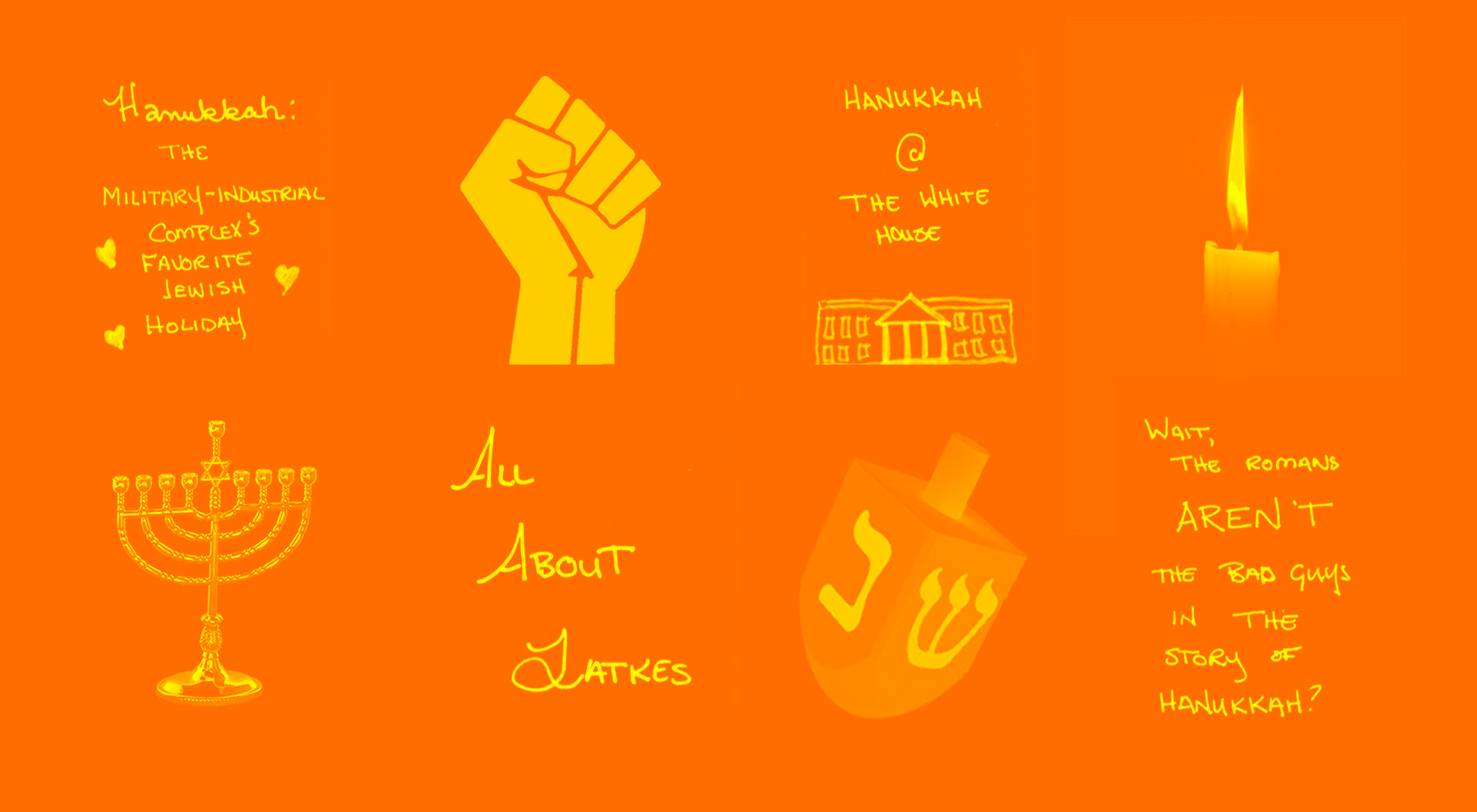Welcome to the Jewish Underground Press! With Hanukkah beginning next month on November 28th, our Jewish zine review columnist Miranda Sullivan gives us the spin on Thursday Bram’s mini-zine series about dreidels, latkes, and the nation state. You can read our columnist’s introduction to our zine review series here.
I never really understood the reason we celebrate Hanukkah. The history always seemed too mystical and far off for me to really get behind the Maccabees’ victory. Like many people I know, I use Hanukkah as an excuse to gather with family and eat, as with all the best Jewish holidays; but after reading “Hanukkah Zine Collection,” by Thursday Bram I’m not so sure I can enjoy my latkes as much, knowing that the holiday is being used by the American Establishment to inspire incoming classes at West Point. Talk about Jewish “gelt.”
In Thursday Bram’s “Hanukkah Zine Collection,” she covers the good, the bad, and the apocryphal of Hanukkah in a set of eight single page, 8-fold zines. Bram really keeps the DIY spirit of zines alive; from her gumroad store you can print out the set and assemble it yourself, which I had fun doing. The zines aren’t particularly aestheticized or illustrated, but Bram writes about the history and traditions of Hanukkah by weaving together nostalgic tips on traditions and critical insights.
The zine set hops from tone to tone, even within individual zines. While a bit abrupt and confusing at times, Bram covers an eclectic range of content. For example, in “All About Latkes,” Bram goes from explaining that Jews only cook potato latkes because European colonizers stole the plant from South America, to outlining her own grandmother’s recipe. As a reader I was expecting more about the history of colonialism, or at least something metaphoric to chew on, not just a literal recipe. However sometimes the fluffier parts, like a hack to calculate the time it takes to play dreidel in “Doing the Math for Dreidel”, worked well, scattered amongst zines that cover more serious topics, giving the reader a break to really let the deeper questions posed in the zine sink in. These questions are the real meat and potatoes (or should I say brisket and latkes) of the zine set.
As American Jews, we celebrate Hanuhkah in a post-Holocaust society with major influences from the American military industrial complex. In Bram’s zine, fittingly titled “Hanukkah: The Military Industrial Complex’s Favorite Holiday,” Bram explains that there is a statue dedicated to Judah Maccabee at West Point Academy. She tells her readers that before West Point was even founded, George Washington was inspired by a Jewish soldier lighting a candle and retelling the story of Hanukkah at Valley Forge. Bram explains that colonial figures liked comparing themselves to a small group of rebels, complimenting their own sensibilities about the divine right of themselves as so-called insurgents.
Looking to modern history in “Hanukkah at the White House,” Bram explains how starting with Jimmy Carter, U.S. presidents have used Hanukkah as a way to seem “accepting” of Jewish communities. Bram paints a picture of American opportunism when it comes to politicians using Hanukkah to appeal to Jewish communities for their own political game. Bram also counts ways in which Hanukkah has been co-opted by Jews to justify war and genocide against Palestinians.
For the most part, Bram presents a collection that prompts the reader to create their own modern commentary rather than presenting a monolithic view of the holiday. After reading these zines, to me it’s clear that Hanukkah is being used by today’s American politicians to punch a hole in their “I’m not discriminatory I have (fill in the blank) friends!” card. It also made me think about the close relationship between Zionist settler-colonialism and the United States’ military industrial complex.
In “Hanukkah at the White House,” Bram points out that it was the eve of the 2017 White House Hanukkah party that the Trump administration recognized Jerusalem as the capital of Israel. In “Hanukkah: The Military Industrial Complex’s Favorite Holiday,” Bram then discusses how Judah Macabee’s victories are also used to justify the occupation of Palestine, stating “Judah’s capital was Jerusalem. He defeated foes in Gaza and Jaffa. As a result, modern-day Israelis are entitled to those areas.” Bram’s zine made me think about how Zionists may use the story of Hanukkah to excuse moral qualms about Palestinian genocide while the non-Jewish American government can utilize the conservative Jewish voting bloc by making strategic political moves to gain access to resources in the Middle East vis a vis Israel. I’ll also note that I wish Bram had clarified that Israelis think they are entitled to Palestine, and not state it as if the entitlement is justified.
It’s no coincidence that Zionist powers co-opt Hanukkah in the same way the U.S government does. The governments are intertwined in their efforts to ethnically cleanse Palestinians; Israel is an ethnic nationalist regime that purports to be in favor of Jewish liberation while systemically destroying vibrant Muslim life in Palestine with the backing of the United States. I think that as Jews, we have to reject both American empire and Zionist settler-colonial empire, informed by a new telling of Hanukkah. Like the Jews living in Judea in 70 BCE, we face the ever-looming power of empire, but today we also face an important moral question. Will the Jewish community support the genocide of Palestine or will we help free Palestine? The Zionist cooption of Hanukkah may seem small, but it represents a much larger issue, an issue of human rights.
Part of Jewish tradition is taking our stories and history and making them relevant to our modern day. Instead of displays of nationalism and allegiances to corrupted states, we can use this Hanukkah as a time to reflect on how to revamp our understanding of the holiday. For me, it stirred thoughts on how to be more vocally anti-Zionist. Since this zine review is being published months ahead of the holiday, we have plenty of time to get comfortable with this interpretation – so no excuses or hate-mail come December (or before then either, please).
Some people think of Hanukkah as the pinnacle of American Jewish assimilation; so much of how we celebrate Hanukkah is Americanized, especially the U.S government’s ostentatious support of the holiday. But Hanukkah is also a time of Jewish visibility. It’s an opportunity for Jews to teach about our cultures, to share our cultures. We can use it as a time to build solidarity, especially to amplify Palestinian voices, and advocate for justice. In many ways, Hanukkah is really an anti-assimilation holiday – it’s one of the most commonly celebrated holidays by otherwise totally secular Jews. Pushing back again Zionist politics and American empire can be a means to resist assimilation and the story of Hanukkah can be used to relay this message to Jews across the devout-to-secular spectrum. After all, Hanukkah was all about resisting assimilation into Hellenistic culture. Instead of submitting ourselves to an Americanized, imperialized telling of Hanukkah, we have the power to reclaim Hanukkah as a time to practice, to be Jewish, and to demand justice in Palestine and beyond, all with Bram’s zine set as our guide.

